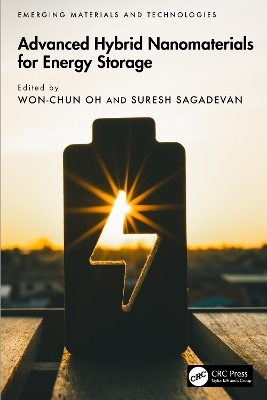
Advanced Hybrid Nanomaterials for Energy Storage
CRC Press (Verlag)
978-1-032-81727-9 (ISBN)
- Lieferbar (Termin unbekannt)
- Versandkostenfrei
- Auch auf Rechnung
- Artikel merken
Integrating nanotechnology and sustainable energy frontiers, Advanced Hybrid Nanomaterials for Energy Storage explores the groundbreaking field of material design at the nanoscale for next‑generation energy storage solutions. This comprehensive text delves into the synthesis, characterization, and optimization of hybrid nanomaterials developed by combining the advantageous properties of diverse materials. This diverse range of materials includes metal oxides, carbon nanostructures, biopolymers, and functionalized surfaces. These materials have the potential to revolutionize energy storage technologies such as batteries and supercapacitors due to their synergistic properties and innovative applications.
FEATURES
Explores the latest advances in hybrid nanomaterial design for energy storage applications
Discusses the benefits of combining different materials at the nanoscale range, exhibiting their combined properties which significantly outperform those of individual components
Defines the various types of hybrid nanomaterials, including metal oxide/carbon nanocomposites, metal‑doped composites, and biopolymer‑based materials
Focuses on the real‑world implications of hybrid nanomaterials in battery electrodes, supercapacitor electrodes, and other energy storage devices
Summarizes the important role of these materials in transitioning to a clean and sustainable energy environment
This book serves as an important resource for both industry professionals and academic researchers and is ideal for scientists and engineers working in advanced materials for energy storage applications.
Won‑Chun Oh is a Full Professor in the Department of Advanced Materials and Engineering at Hanseo University in Korea and at the School of Materials Science and Engineering at Anhui University of Science and Technology in China. He is a Guest Professor at various other universities throughout China, Thailand, and Indonesia. He obtained the Research Front Award from the Korean Carbon Society, the Yangsong Award from the Korea Ceramic Society, the Excellent Paper Award from the Korea Journal of Material Research, as well as the Best Paper Award from the Journal of Industrial and Engineering Chemistry for his pioneering work. He has also received the Award of Appreciation from ICMMA2011, ICMMA2014, and ICMMA2019. He is an ICMMA Committee Board Member, and from 2007 to the present, he has served as a Conference Chairman and Vice‑Chairman for ICMMA. He has authored or coauthored 806 papers in domestic and international journals, and he currently serves as the Editor‑in‑Chief of the Journal of Multifunctional Materials and Photo Science and the Asian Journal of Materials Chemistry. He is an Advisory Board Member of the Asian Journal of Chemistry and Nanomaterials. Suresh Sagadevan is an Associate Professor at the Nanotechnology and Catalysis Research Centre at the University of Malaya. He has published more than 450 research papers in ISI top‑tier journals and Scopus and has authored 12 international book series and 60 book chapters. He is an Editor, Guest Editor, and Editorial Board Member of many reputed ISI journals and a member of many professional bodies at the national and international levels. He is a recognized reviewer for many reputed journals, and his work spans various fields, such as nanofabrication, functional materials, graphene, polymeric nanocomposite, glass materials, thin films, bioinspired materials, drug delivery, tissue engineering, cell culture, supercapacitor, optoelectronics, photocatalytic, green chemistry, and biosensor applications.
1. Latest Technologies in Solid‑State Electrolytes Related to Energy Storage Applications Based on 2D MXenes. 2. Two‑Dimensional MXenes for Supercapacitor Applications and Prospects. 3. Carbon‑Based Hybrid Materials as Advanced Electrodes for Structural Supercapacitors. 4. Carbon Derivatives‑Based Silicon as Anode Materials for Lithium‑Ion Batteries. 5. Carbon‑Based Composites for Energy Storage Applications. 6. Nanomaterials for the Development of Electrodes. 7. Application of Carbon Nanomaterials in Supercapacitors. 8. Development of g‑C3N4‑Based Nanocomposite for Hydrogen Production and Battery Applications. 9. MXenes‑Based Energy Storage Applications: Low‑Dimensional Structural Design and Functional Expansion. 10. Application of Nano materials in Electrochemistry. 11. Electric Double‑Layer Capacitor Using Carbon Materials. 12. Advanced Hybrid Nanomaterials for Energy Storage.
| Erscheinungsdatum | 11.12.2024 |
|---|---|
| Reihe/Serie | Emerging Materials and Technologies |
| Zusatzinfo | 26 Tables, black and white; 16 Line drawings, black and white; 103 Halftones, black and white; 119 Illustrations, black and white |
| Verlagsort | London |
| Sprache | englisch |
| Maße | 156 x 234 mm |
| Gewicht | 770 g |
| Themenwelt | Naturwissenschaften ► Biologie |
| Naturwissenschaften ► Chemie ► Physikalische Chemie | |
| Naturwissenschaften ► Physik / Astronomie | |
| Technik ► Elektrotechnik / Energietechnik | |
| Technik ► Umwelttechnik / Biotechnologie | |
| ISBN-10 | 1-032-81727-5 / 1032817275 |
| ISBN-13 | 978-1-032-81727-9 / 9781032817279 |
| Zustand | Neuware |
| Informationen gemäß Produktsicherheitsverordnung (GPSR) | |
| Haben Sie eine Frage zum Produkt? |
aus dem Bereich


